
You can support Terra Relicta by donating! Please, do so, and thank you!

Interview with: Ian Revell
Conducted by: Ines
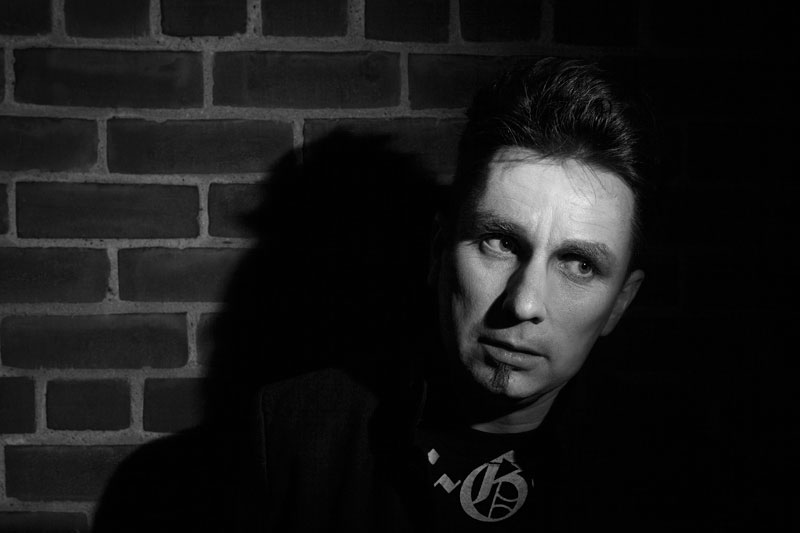 I will remember the year 2014 by some exquisite releases and Double Eyelid’s debut full length album Seven Years (you can read the review HERE) is definitely one of those. A music project hailing from Toronto embraces a wide array of sounds and creates a very memorable, atmospheric and highly captivating web of tunes. Building their musical story by combining features that vary from goth to glam, from smooth to eruptive, from incredibly calm to intensively dark with a strong theatrical vibe, makes Double Eyelid more than unique. They’re the Mad Max of high art and Picasso from the streets. Art-damaged, as they state themselves. Ian Revell, the band’s creative force, kindly took the time to reveal what this project stands for, how was it started and brought to the point where it is now.
I will remember the year 2014 by some exquisite releases and Double Eyelid’s debut full length album Seven Years (you can read the review HERE) is definitely one of those. A music project hailing from Toronto embraces a wide array of sounds and creates a very memorable, atmospheric and highly captivating web of tunes. Building their musical story by combining features that vary from goth to glam, from smooth to eruptive, from incredibly calm to intensively dark with a strong theatrical vibe, makes Double Eyelid more than unique. They’re the Mad Max of high art and Picasso from the streets. Art-damaged, as they state themselves. Ian Revell, the band’s creative force, kindly took the time to reveal what this project stands for, how was it started and brought to the point where it is now.
Ines: Hello Ian and first of all, thank you so much for your time to doing this interview for our webzine. However, the first question is mainly to satisfy my curiosity: when I sent you my review, you said there were some references that you didn't expect - may I ask which those were?
Ian: Ha - well, I suppose it's the first time anyone's cited a list of influences that includes Michael Jackson and Christian Death... Michael Jackson was the one that really surprised me. But I had to think about it and the more I thought about it, I could see how it kind of made sense as much of my writing is really bass-line/groove-focused. So there's funk in it. Also some of my vocalizations can be faint and whispery/breathy. And his music was fairly unavoidable when I was growing up in the 80s so there's probably an influence there even if it's unacknowledged (or undesired). The Bald Soprano - I had heard a bit about that but I don't know the work. So that was kind of surprising. It sounds like a mix of existentialism and theatre of the absurd, both of which I was really interested in at one point. I'd like to check it out. There's a kind of existential dread that's a theme in the album by the time we get to the last few tracks – “Dirty Weather” is kind of the end of a line, a realization that you've hit a wall and can't go any further, it's a completely paranoid low point. And “The Stranger” - which even though it's a cover song, it's there for thematic reasons - it continues that feeling but sort of turns it around with the idea “I can be the stranger, I can recreate my mind” - so when you've burnt everything out and all you have left of yourself is a hollow shell, you can fill it with whatever you want. Which is a bit of a dark thing to embrace and celebrate; but that was Rozz. So I'm only guessing - but was that the connection with The Bald Soprano? I'd like to know...
Ines: I didn’t say I felt your music was influenced by all these different artists, but that, while I was listening to Seven Years, a lot of completely unconnected associations ran through my mind and those were the ones that really stood out. OK, I’m going to try to explain this as shortly as possible [a long explanation followed.] Now that you mentioned even “The Stranger” is there for a reason and that it thematically fits the album; what are the themes you wanted to express with the album and what inspires you to write about them?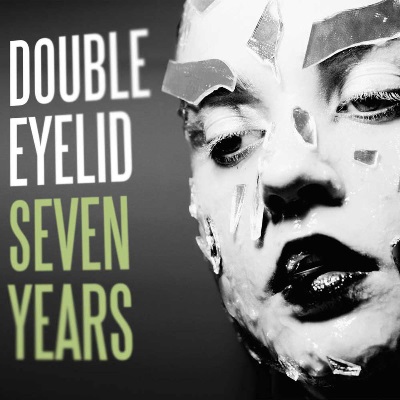 Ian: [Speaking of my explanation:] Those are some interesting thoughts. Rozz is very important to me and that's a great association; I don't think I quite get to that level of pathos, though. With him there was no safety net, you're off the deep end, gone, baby. And we can further close this circle by recalling that The Stranger by Camus was also the inspiration for “Killing An Arab” by The Cure - and you said I sounded like Robert Smith, right? (Actually that might have been another reviewer?) [Yes, it was another reviewer. Moving further to my question:] OK for the question - a bit open-ended - but I'll try: first of all - to talk about the music and talk about the lyrics - those are two different conversations. So thinking about the lyrics - I tell stories, often they're based in real life, once in a while they're completely escapist, most commonly they're rooted in something real and then twisted beyond recognition. And even when the entire song is about somebody else, the personality of the narrator is usually the most important presence. I'm not a perfect person in real life. But in my songs - I'm really quite deeply flawed. And I'm usually making observations about other people who are perhaps even more flawed. Or perhaps not. But you're the listener and you need to decide who you're going to trust. Songwriters like Morrissey - he's had a big influence on me and he writes songs about hundreds of different people and things, issues, but every single one is ultimately about him, first and foremost. That's the approach – themes: loving things/people that are flawed, wanting things that could be bad for you. Exorcising and exercising demons. Temptation. Seeing people make bad choices and being unable or perhaps unwilling to help them. Knowing that your bad decisions will eventually catch up with you. A tainted outlook.
Ian: [Speaking of my explanation:] Those are some interesting thoughts. Rozz is very important to me and that's a great association; I don't think I quite get to that level of pathos, though. With him there was no safety net, you're off the deep end, gone, baby. And we can further close this circle by recalling that The Stranger by Camus was also the inspiration for “Killing An Arab” by The Cure - and you said I sounded like Robert Smith, right? (Actually that might have been another reviewer?) [Yes, it was another reviewer. Moving further to my question:] OK for the question - a bit open-ended - but I'll try: first of all - to talk about the music and talk about the lyrics - those are two different conversations. So thinking about the lyrics - I tell stories, often they're based in real life, once in a while they're completely escapist, most commonly they're rooted in something real and then twisted beyond recognition. And even when the entire song is about somebody else, the personality of the narrator is usually the most important presence. I'm not a perfect person in real life. But in my songs - I'm really quite deeply flawed. And I'm usually making observations about other people who are perhaps even more flawed. Or perhaps not. But you're the listener and you need to decide who you're going to trust. Songwriters like Morrissey - he's had a big influence on me and he writes songs about hundreds of different people and things, issues, but every single one is ultimately about him, first and foremost. That's the approach – themes: loving things/people that are flawed, wanting things that could be bad for you. Exorcising and exercising demons. Temptation. Seeing people make bad choices and being unable or perhaps unwilling to help them. Knowing that your bad decisions will eventually catch up with you. A tainted outlook.
Ines: Oh, Morrissey, I love him and his work too. As you said: lyrics are one topic and music another - but with Seven Years it's just the prefect mixture, because all those things you just named - you also express with music. How do you approach song writing?
Ian: It usually it starts with a little germ of both the music and lyrics - usually a single riff, together with a few words. Then the music gets developed until it forms a big enough skeleton to hold more lyrics, at which point I have to figure out what the whole thing is about. Generally most of this happens while I'm out taking walks or something like that - I'm not someone who sits down and improvises until I hear something cool. I mean, that happens sometimes but it's rare, for me. I kind of pick my ideas like delicate flower blossoms and then I'm afraid I'll damage them if I push them around too much. So the idea comes, I sit down at the piano and play it out once or twice to make sure I know what it is, and then I step away from the instrument and there might be a period of weeks or months where I just come back to it in my head and think about it, developing it. So usually by the time it comes to demo-ing it and bringing it to my collaborators I'm fairly secure with the song and know the direction I want. Every song is different and demands a different approach. One of my favourite albums is Brian Eno's first, Here Come The Warm Jets and I like it because the overwhelming feeling you get when listening is that the artists just felt incredibly free - it's a really wonderful, nonsensical, un-constrained work that is full of life. I think good music needs to make its own rules. Part of the essential dynamic of this project is that it's driven by a single vision. It's more than a solo project - every musician who has worked on it has given something that is uniquely and irreplaceably them. But the premise has always been that I'm calling the shots. So when you know that artistically, you only really have to answer to yourself, it makes things possible that perhaps wouldn't be otherwise. You pursue that weird idea and see where it goes, because there's no one in the rehearsal room saying 'we can't do that!' But of course then you need to know when to abandon an idea that isn't working. And thank your honourable friends and collaborators, many times over, for their unflagging support.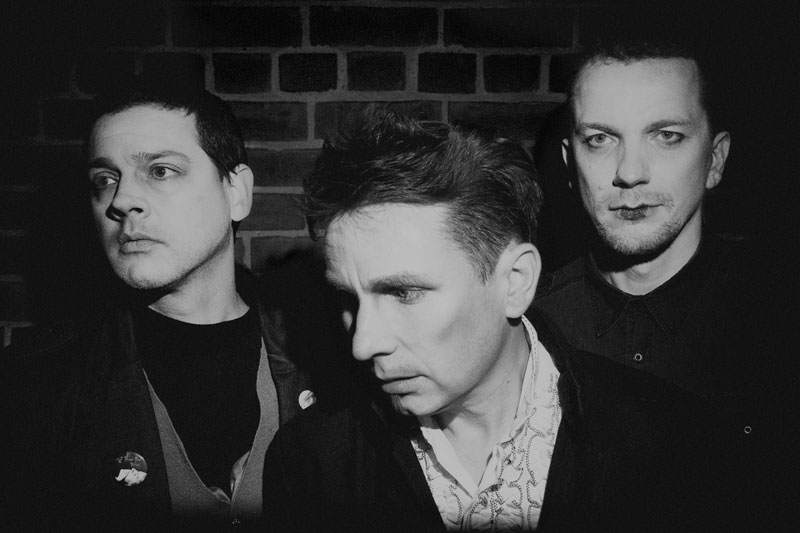 Ines: What about your band mates, Benjamin Mueller-Heaslip and Karl Mohr; how do they contribute to Double Eyelid's music?
Ines: What about your band mates, Benjamin Mueller-Heaslip and Karl Mohr; how do they contribute to Double Eyelid's music?
Ian: Ben, Karl and I have known each other for a long time, we're old friends. Karl has been a singer, writer of songs and producer of his own - more synth-focused brand of darkwave - for years. In fact, the first time the three of us worked together, it was on Karl's songs, and I was playing guitar. For years, he had been recording completely autonomously and this was his attempt at creating a live line-up. We did one show and then I left to go and live in Asia for a while. Karl and Ben kept working together on his songs, I came back to Canada a few years later and we revived that line-up for a handful of shows, then Karl sort of wanted to take things in a different direction for a while. Ben started his own project which was more of a chamber music thing. I started writing songs and singing them, then someone asked me if I could do a gig for her and it gave me the motivation I needed to finish some songs and get a live line-up together. Naturally I looked to Ben and Karl. And I don't think I could have started this with anyone else. Ben is an incredibly intuitive player who is a true master of his instrument. What he does on the record many critics/listeners have been comparing to Mike Garson, who was David Bowie's pianist on Aladdin Sane and other records. And I can see the parallel because he's bringing this jazz approach to music that you wouldn't normally hear it in, and when it works well it can really elevate the sense of what the music is. Every track that he is on, he managed to transform in some way. The sessions with him were great because he would do something different every time, then I'd have to take it home and spend hours sorting through it. He's a wonderful guy to work with. Karl - well, he's also kind of a producer on this. So beyond the guitar, he was really very intimately involved in the sound of the whole thing. And I think because we've been working together for so long, on my songs and on his, he intuitively understands what I'm going for quicker than anyone else. We don't really collaborate in terms of writing, but I'll show him stuff that's in a half-developed state that I wouldn't show anyone else because I know he'll get it. So yeah, intimately involved since before the beginning and on the guitar he knows exactly what to bring. And again, like Ben he really had the space to take things in different directions and elevate the material. An unconventional guitarist though - he's a total riff master, but he hates doing solos. Loves making weird, atmospheric noises. Now, near the end of our work on the album he basically said that he had put his heart into the album and it was going to be great, but he needed to get back to working on his own project. And I completely understood because as his friend I knew it was true. So since the release of the album I've been working with Sky Shaver on guitar, and he's also an old friend, great guy and a amazing guitarist and he's really been helping us make the live shows kill. I'm looking forward to recording with him as well. But I can say 100% that Karl will be involved in some capacity in the next album, likely on the production side. So he's still a part of this project.
Ines: Wow Ian, I can scratch at least two of my questions now because you have already answered it in this one. In your words Double Eyelid is not a band, but more of a project – does that mean we can expect your collaboration also in further, that would result in new album(s) or is this it? I know Seven Years is still a very fresh release, but I can't help my curiosity.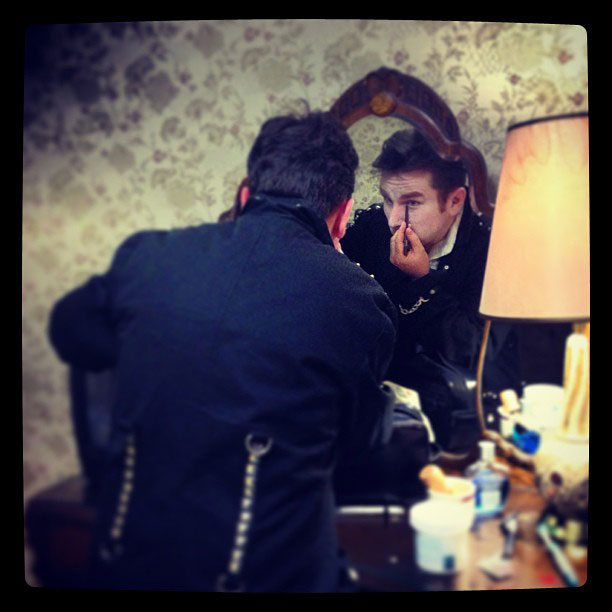 Ian: Oh, of course there will be more, much more! By “project” I didn't in any sense mean that this was a one-off. I just see bands and projects as operating differently - bands kind of do everything together, but in Double Eyelid I'm working independently and then when things get to a certain point I call in one or more of my collaborators and we work on building it up together. Definitely there will be a next album. I'm bad with schedules - this one took about a year longer than I had hoped - so don't ask me when. But the next one is in the planning stages already and we could be getting to some recording soon.
Ian: Oh, of course there will be more, much more! By “project” I didn't in any sense mean that this was a one-off. I just see bands and projects as operating differently - bands kind of do everything together, but in Double Eyelid I'm working independently and then when things get to a certain point I call in one or more of my collaborators and we work on building it up together. Definitely there will be a next album. I'm bad with schedules - this one took about a year longer than I had hoped - so don't ask me when. But the next one is in the planning stages already and we could be getting to some recording soon.
Ines: Okay, I understand now. Onward to your music now; I remember reading somewhere, and I quote: “Double Eyelid makes art-damaged music that fits somewhere on the musical spectrum between glam and goth.” I am really intrigued: what does "art-damaged music" means?
Ian: I first heard the term "art-damaged" via the Drop Dead Festival - which bills itself as the Premier Festival for Art Damaged Music - and I thought, well, there's a genre tag I can get behind. I've never seen a definition, but in every project I've worked on - and the same is true for the other projects Karl and Ben have worked on as well - I've pursued art at the cost of perhaps making it accessible to a wider audience... So I interpret that label as meaning that the “art” has “damaged” the end product. but if it's “damaged” by art, it's only damaged in the same way that grape juice is “damaged” by leaving it sitting in a barrel for too long - it really just means that you can't serve it to kids anymore. The genre discussion is kind of an interesting one... I'm not really sure where we fit but I'm happy that the goth scene is embracing us to an extent...
Ines: Interestingly you say that, because I have noticed nowadays a lot of musicians want to be free of boundaries and labelling. But then again, I always feel when presenting some new music to other people, I must somehow put into words to what they are about to listen. You said the gothic community embraced you, is that something you are somehow "proud of" or so to say? Did you expect Seven Years to be accepted within the gothic music listeners?
Ian: Well, I think we made a multi-genre album in some ways, but I agree that genre labels are a necessary evil. For us. We didn't start off by presenting ourselves as a goth band. The audience told us early on that was what we were doing and I just kind of went with that. And to be perfectly honest, I think the main “cue” people were responding to there was the sound of my voice, so it was sort of a natural thing. I love the goth audience though, because they're by and large really intelligent and open-minded. Most of the reviews we get describe us as being on the "experimental" side of goth, which is a description I'm happy with. Actually, most of the "goth" music I listen to is on the experimental side of the genre. Sex Gang Children - an all-time favourite of mine - it's really more like theatrical glam rock with punk influences, but he's one of the cult heroes of the original goth era. Alien Sex Fiend, as well - they're like Suicide with a slightly more demented frontman, and yet they're classic batcave. So as a goth band you don't “need” to sound like The Mission, Fields Of The Nephilim and so on. It is a broad genre that's more about having a certain ethos than a cookie-cutter approach to a sound, so I don't mind the label.
Ines: I do agree with you on the experimental part - it is probably why I love Seven Years so much. It indeed is very theatrical and going in this direction I can't help to wonder, how does the "theatrical" part fall into music; is that something you aimed to achieve with your music or did it just occur naturally?
Ian: I think the theatricality is natural. There is drama in the lyrics, life-and-death themes and then in the studio we try to build up the music to reflect that, when it works well it can have a filmic quality.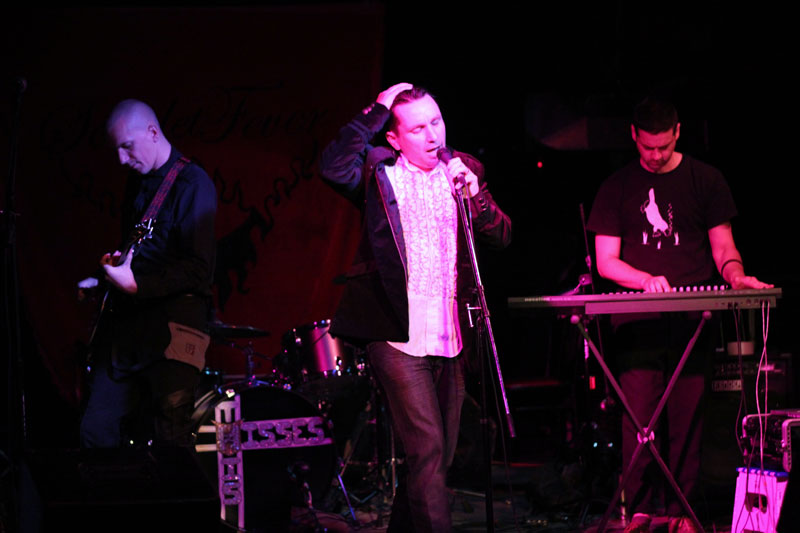 Ines: Speaking of theatrical and as I have not yet been given the pleasure to see you live; what can one expect when coming to see Double Eyelid perform?
Ines: Speaking of theatrical and as I have not yet been given the pleasure to see you live; what can one expect when coming to see Double Eyelid perform?
Ian: Live we are a bit rawer and stripped down, less polished, guitars are a bit louder and more aggressive. There are usually a few surprises as well; we'll typically throw in a few cover songs at the end of our set that we never plan on recording.
Ines: If it's not too much of a secret, could you give us a few of those songs you cover live?
Ian: There has been a bunch - for a while we would do “Interzone” by Joy Division at almost every show but other than that it's mostly been different every time. “Dream Home Heartache” by Roxy Music, “Physical” by Adam Ant, “My Little Black Angel” by Death In June. Those are some, there have been others... It's just a way of acknowledging our influences and having a little fun at the end of the night. We also recorded an unusual cover version of ''Spiritual Cramp'' by Christian Death for our Dead Is Better single that came out in 2012, it's on the B-side and Rikk Agnew commented, he liked it.
Ines: We already talked about your cover of “The Stranger” by Rozz Williams and how it fits to Seven Years. But the album also included the song "John" by Arthur S. Green and I must admit, I am not familiar with this song or the author himself. Could you give us some details about it and why did you also decided to feature this song on the album?
Ian: Many, many years ago, I was the bass player in a trio with a sound that was similar to Alice In Chains and Stone Temple Pilots - those bands at the time that were fusing the grunge sound with a slightly more sleazy 70s glam thing. We were called William Goat and because we were only active in the days when there was no music on the internet, and we didn't make much of an impact, there is not a trace of us that can be found online. The leader of that band was an insane fellow named Arthur S. Green, he wrote the songs and played guitar. The band was a tempestuous, on-and-off situation that lasted a couple of years before it finally disintegrated in a haze of drugs and dashed hopes. Arthur S. was unlike any person I'd ever met before and to this day I've never known anyone who writes songs like his. When I started Double Eyelid, I was unsure of the direction I was going to take it in. But the song "John" had stuck with me since my days with William Goat. I thought it was a brilliant piece of writing. Now, when William Goat broke up, Arthur S. literally disappeared - I don't know anyone who is in contact with him now, and believe me I've looked for him. Not to get morbid about it, but I have no idea if he's living or dead. And if he's still living, I have no idea if he's writing songs or performing anywhere. And I loved his song writing and as I said, having put my heart into William Goat for a couple of years I was always disappointed by the fact that the music never reached a wide audience and there was no proper archive of it. So we began covering “John” live, and when it came time to record the album I wanted to do the best version of it I could, so that William Goat can rest in peace, so to speak. And now more people have heard it than ever came to a William Goat gig, so it gives me some satisfaction that his music has finally gotten heard. If he's still around, maybe he'll hear it himself some day and give me a call.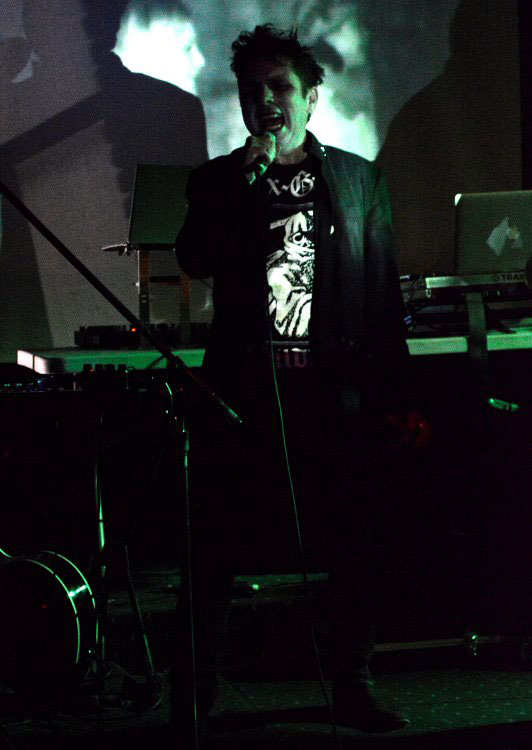 Ines: Thank you very much for sharing this personal story with us, Ian. One more thing that also caught my attention is the cover artwork of your album. I must admit I'm not particularly keen on cover arts and rare are those that speak to me, but yours does. Is the face on the front cover hiding any story behind it?
Ines: Thank you very much for sharing this personal story with us, Ian. One more thing that also caught my attention is the cover artwork of your album. I must admit I'm not particularly keen on cover arts and rare are those that speak to me, but yours does. Is the face on the front cover hiding any story behind it?
Ian: Thank you for the compliment, but I can't take any credit for the cover image. I found it on the Deviantart website and contacted the artist, whose name is Caryn Drexl. That one is a self-portrait; she's the model as well. It resonated with me because of the themes of the album, which we talked about before, involving personal and spiritual wreckage. And you see her in this wreckage, but then she's taken the time to artfully arrange the wreckage around her, on top of her and to make it look pretty. Once I saw it I couldn't think of using anything else. In fact, the record was finished but I didn't have the title then. So it helped shape that as well. There's much more I could say about this but I don't want to take away from anyone's process of enjoying and discovering the work.
Ines: Now that you mentioned the album title - how did you eventually come to the title Seven Years?
Ian: Did you know the whole idea of a broken mirror meaning seven years of bad luck goes back to the Romans? And the reason why it was seven years was because they also believed the body renewed itself once every seven years. This record marks the closing of a chapter, it's an exorcism in a sense, exhausting to get through but satisfying now that it's finished. The next one will be quite different. Beyond that I don't really want to explain too much about it. People need to find their own point of entry.
Ines: I did actually, because it's a very common saying here. If you break a mirror, you can be sure someone will remind you seven years of misfortune will follow. But I would have never linked the album title with that. There's one thing that really has my curiosity as well: does Canada have a "strong" goth - and related genres - scene? I really can't imagine because in Europe there are some countries that have a stronger scene and I really have no idea what goes on in Canada, or more specifically - Toronto where you're from?
Ian: It's funny that you didn't make that link, but maybe you did on a subconscious level? I prefer dropping little clues all over the place to spelling things out explicitly. So anyways - about Toronto and Canada: first of all there are some great artists in Canada in the goth/darkwave scene - to name a few there are Johnny Hollow, The Birthday Massacre and Glenn Love, as well as artists like Trust who is more like dark synthpop, also Crystal Castles who are huge, and Koban - and these are artists that have been making waves internationally. There are also some great but seriously under-appreciated artists with strong local followings like Corpusse and The Scarlet Fever, as well as pioneers like Gary Numan's friend Nash the Slash (RIP). The “goth scene” itself however I would say is not that strong right now. It's very marginal. In some cities it's better than in others. In Toronto, it was a bit stronger in the mid-to-late 90s and I'd say it's at a low point now. And the scene that exists, sadly, is by and large more interested in nostalgia and in DJ nights than in supporting new artists. There are a few good promoters who are working to change that. But to be brutally frank, with a couple of wonderful exceptions the DJs that I actually know personally in Toronto have shown less interest in supporting our music than DJs and bloggers in the UK like Mick Mercer, Cruel Britannia and others in all parts of the world, from Mexico to Greece, as well as in other parts of Canada - we've been getting a fair bit of support on the west coast, and in Montreal, for example. And I have to ask, why 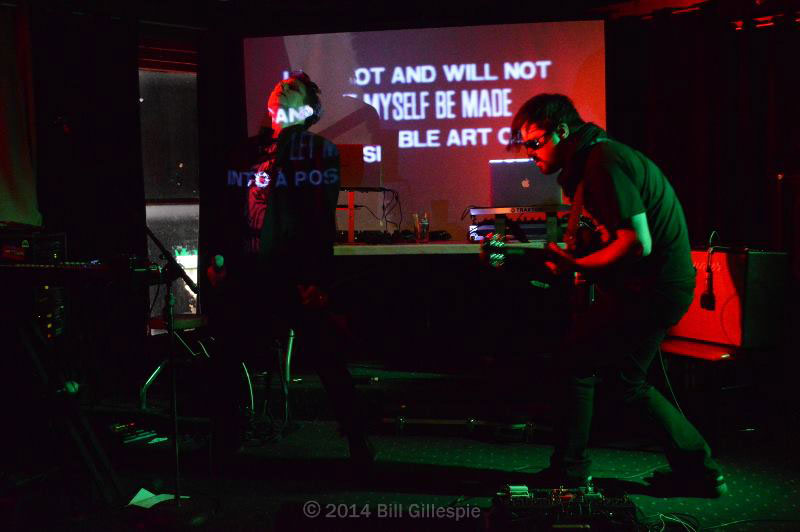 is that? And I know I'm not the only Toronto artist with this problem. On top of this - since you want to know about Canada, I should mention the difficulty that all Canadian artists face, which is the problem of geography - we have a small population, spread out over a vast territory with a climate that is similar to Russia's. And the population is kind of clustered in the eastern part and in the western part, with maybe one major city by itself in the middle. So we're in the eastern part, which is better for small tours as there are about maybe five or six medium-to-big cities we can hit within a day's drive. That's not too bad, but once you've done it there's nowhere really to go from there. You can go to the USA, but the bureaucracy involved with that means it's about 6 months of planning and big expenses for permits, etc. More of a long-term plan. You could commit to the 4-day drive to get to the western part of Canada but then once you get there, there are only maybe 3 cities to play in and then you have do the drive back home. And this is why many of the artists I mentioned earlier looked to Europe early on - there are more opportunities - you have festivals there that would never happen here, or even in the US. And the cost of air travel doesn't seem so bad when your alternatives are dealing with the US Department of Homeland Security or the tedium and low rewards of the cross-Canada tour. So we've begun working with Deadfall Management to see what we can do in terms of shows in the UK and Europe for 2015... Maybe there will be some news to report there in the coming months.
is that? And I know I'm not the only Toronto artist with this problem. On top of this - since you want to know about Canada, I should mention the difficulty that all Canadian artists face, which is the problem of geography - we have a small population, spread out over a vast territory with a climate that is similar to Russia's. And the population is kind of clustered in the eastern part and in the western part, with maybe one major city by itself in the middle. So we're in the eastern part, which is better for small tours as there are about maybe five or six medium-to-big cities we can hit within a day's drive. That's not too bad, but once you've done it there's nowhere really to go from there. You can go to the USA, but the bureaucracy involved with that means it's about 6 months of planning and big expenses for permits, etc. More of a long-term plan. You could commit to the 4-day drive to get to the western part of Canada but then once you get there, there are only maybe 3 cities to play in and then you have do the drive back home. And this is why many of the artists I mentioned earlier looked to Europe early on - there are more opportunities - you have festivals there that would never happen here, or even in the US. And the cost of air travel doesn't seem so bad when your alternatives are dealing with the US Department of Homeland Security or the tedium and low rewards of the cross-Canada tour. So we've begun working with Deadfall Management to see what we can do in terms of shows in the UK and Europe for 2015... Maybe there will be some news to report there in the coming months.
Ines: I was just about to ask you about you recent signing to Deadfall Management and what do you expect from it. And it would definitely be a joy to see you in Europe as well. But one step at a time. You also have one vide out, for the song ''Dead Is Better''. What's the story behind the video?
Ian: We were lucky enough to connect with Steven Cerritos, who appreciated the dark sense of humour in “Dead Is better” and wanted to make a video for it. He was already making a name for himself in the horror genre but he was trying to break into the music video business, so he took us on as a project. We had incredible luck getting a good crew together, we had great people working on the project with us, notably Lovina Yavari, the actress, who also did her own makeup and came up with her own costumes. Very small crew, most of the time there were just five or six people there, and the entire shoot was done outside at different locations we found - everything was shot with hand-held cameras, no big tripods or lights so if anyone came and told us we had to get lost we could pick up and leave very quickly! We shot it outside over four weekends in November and December and by the last weekend it was starting to get ridiculously cold. But we were lucky, because at any time we could have had a huge snowstorm come along and ruin the continuity - anyways, when Steven started showing me rough edits I couldn't believe how good it looked, he really is an exceptional talent. We're definitely going to be working with him again soon.
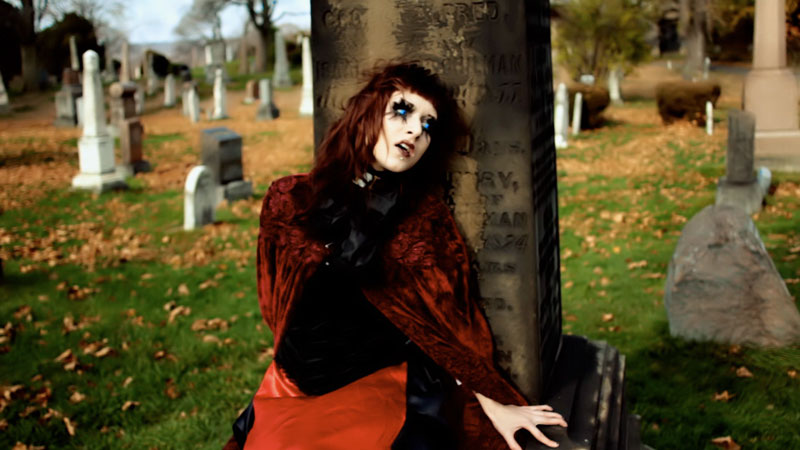 Ines: All right, keep us posted! And now, if you don't mind or find it too personal: could you reveal a bit about yourself to our readers - who is Ian when he's not a part of Double Eyelid?
Ines: All right, keep us posted! And now, if you don't mind or find it too personal: could you reveal a bit about yourself to our readers - who is Ian when he's not a part of Double Eyelid?Double Eyelid links: Official website, Facebook, Bandcamp, Twitter, Soundcloud, YouTube
Benjamin Mueller-Heaslip: Wikipedia, Sky Shaver (touring guitarist): Bandcamp, Karl Mohr: Dead Red Velvet